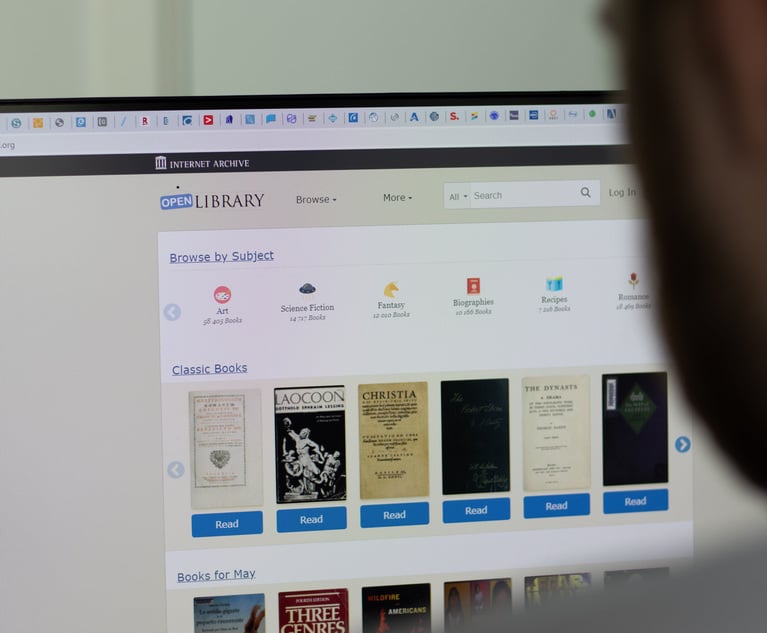 U.S. International Trade Commission building.
U.S. International Trade Commission building.Pleading Importation: ITC Decisions Highlight Need for Adequate Evidentiary Support
The International Trade Commission is empowered to block the importation into the United States of products that infringe U.S. intellectual property rights, In the past, the ITC generally instituted investigations without questioning the importation allegations in the complaint, however in several recent cases, the ITC declined to institute an investigation as to certain proposed respondents due to inadequate pleading of importation.
November 13, 2024 at 02:50 PM
9 minute read
What You Need to Know
- Section 337 of the U.S. Tariff Act empowers the International Trade Commission to block the importation into the United States of products that infringe U.S. intellectual property rights.
- A well-pled ITC complaint should adequately describe specific instances of importation or sales and provide exhibits supporting those allegations.
- As the ITC's recent decisions reveal, failure to include such evidence in a complaint can lead to a denial of institution.
Section 337 of the U.S. Tariff Act empowers the International Trade Commission (ITC or Commission) to block the importation into the United States of products that infringe U.S. intellectual property rights, including patents, copyrights, trademarks, and trade secrets. Under the ITC's pleading requirements, a Section 337 complaint filed at the ITC must "[d]escribe specific instances of alleged unlawful importations or sales." 19 CFR §210.12 (a)(3). In the past, the ITC generally instituted investigations without questioning the importation allegations in the complaint. In several recent cases, however, the ITC declined to institute an investigation as to certain proposed respondents due to inadequate pleading of importation. This article surveys those decisions and offers advice for parties filing an ITC complaint and those opposing institution of an investigation with respect to importation allegations.
NOT FOR REPRINT
© 2024 ALM Global, LLC, All Rights Reserved. Request academic re-use from www.copyright.com. All other uses, submit a request to [email protected]. For more information visit Asset & Logo Licensing.
You Might Like
View All
Life, Liberty, and the Pursuit of Customers: Developments on ‘Conquesting’ from the Ninth Circuit
8 minute read
Justices Consider Scope of Corporate Remedies for Trademark Infringement

OpenAI Tells Court It Will Seek to Consolidate Copyright Suits Under MDL
3 minute read
Trending Stories
Who Got The Work
Michael G. Bongiorno, Andrew Scott Dulberg and Elizabeth E. Driscoll from Wilmer Cutler Pickering Hale and Dorr have stepped in to represent Symbotic Inc., an A.I.-enabled technology platform that focuses on increasing supply chain efficiency, and other defendants in a pending shareholder derivative lawsuit. The case, filed Oct. 2 in Massachusetts District Court by the Brown Law Firm on behalf of Stephen Austen, accuses certain officers and directors of misleading investors in regard to Symbotic's potential for margin growth by failing to disclose that the company was not equipped to timely deploy its systems or manage expenses through project delays. The case, assigned to U.S. District Judge Nathaniel M. Gorton, is 1:24-cv-12522, Austen v. Cohen et al.
Who Got The Work
Edmund Polubinski and Marie Killmond of Davis Polk & Wardwell have entered appearances for data platform software development company MongoDB and other defendants in a pending shareholder derivative lawsuit. The action, filed Oct. 7 in New York Southern District Court by the Brown Law Firm, accuses the company's directors and/or officers of falsely expressing confidence in the company’s restructuring of its sales incentive plan and downplaying the severity of decreases in its upfront commitments. The case is 1:24-cv-07594, Roy v. Ittycheria et al.
Who Got The Work
Amy O. Bruchs and Kurt F. Ellison of Michael Best & Friedrich have entered appearances for Epic Systems Corp. in a pending employment discrimination lawsuit. The suit was filed Sept. 7 in Wisconsin Western District Court by Levine Eisberner LLC and Siri & Glimstad on behalf of a project manager who claims that he was wrongfully terminated after applying for a religious exemption to the defendant's COVID-19 vaccine mandate. The case, assigned to U.S. Magistrate Judge Anita Marie Boor, is 3:24-cv-00630, Secker, Nathan v. Epic Systems Corporation.
Who Got The Work
David X. Sullivan, Thomas J. Finn and Gregory A. Hall from McCarter & English have entered appearances for Sunrun Installation Services in a pending civil rights lawsuit. The complaint was filed Sept. 4 in Connecticut District Court by attorney Robert M. Berke on behalf of former employee George Edward Steins, who was arrested and charged with employing an unregistered home improvement salesperson. The complaint alleges that had Sunrun informed the Connecticut Department of Consumer Protection that the plaintiff's employment had ended in 2017 and that he no longer held Sunrun's home improvement contractor license, he would not have been hit with charges, which were dismissed in May 2024. The case, assigned to U.S. District Judge Jeffrey A. Meyer, is 3:24-cv-01423, Steins v. Sunrun, Inc. et al.
Who Got The Work
Greenberg Traurig shareholder Joshua L. Raskin has entered an appearance for boohoo.com UK Ltd. in a pending patent infringement lawsuit. The suit, filed Sept. 3 in Texas Eastern District Court by Rozier Hardt McDonough on behalf of Alto Dynamics, asserts five patents related to an online shopping platform. The case, assigned to U.S. District Judge Rodney Gilstrap, is 2:24-cv-00719, Alto Dynamics, LLC v. boohoo.com UK Limited.
Featured Firms
Law Offices of Gary Martin Hays & Associates, P.C.
(470) 294-1674
Law Offices of Mark E. Salomone
(857) 444-6468
Smith & Hassler
(713) 739-1250








